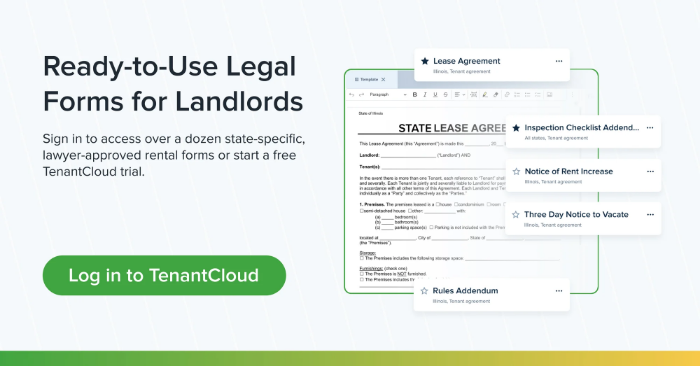
Whether you are a landlord or a tenant, having a firm understanding of Missouri eviction laws is critical. These laws help to provide clear guidance on the eviction process, including key factors such as notice periods, legal requirements, and what steps to take should one party not comply.
Having a strong grasp of Missouri eviction laws will help to reduce friction between landlords and tenants. Let's explore these laws further so that you can be prepared for anything headed your way.
What is the Eviction Process in Missouri?
If you are a Missouri landlord, it is essential you understand the Missouri eviction process. This is a clear step-by-step process that ensures fairness for both landlords and tenants, and the procedure is as follows:
Step 1: Grounds for eviction
Before a tenant can be evicted, landlords must establish a legal reason to serve them notice. Some of the most common grounds for eviction include:
- Non-payment of rent
If the tenant has not paid rent by the agreed date, then it gives grounds to begin the eviction process.
- Lease violations
Another common reason is if the tenant has breached specific terms of the lease agreement, such as having pets or damaging the property.
- Illegal activity
Any form of illegal activity being carried out on the property by the tenant is cause for eviction.
- Holdover tenancy
This is the term given when the tenant refuses to vacate the property after the lease term has ended.
Step 2: Serve written notice
Before you can begin the eviction process, landlords will need to serve written notice to the tenant. This notice must specify clearly the reason for the eviction and also outline any potential chances for them to remedy the issue or vacate the property. The most common kinds of notice are:
- Pay or quit notice
This type of written notice is served for unpaid rent and gives the tenant a specific timeframe in which to pay or vacate.
- Cure or quit notice
For lease violations, this form of written notice provides the tenant with a timeframe to fix the offending issue (such as removing an unauthorized pet).
- Unconditional quit notice
If the tenant has made severe violations, such as undertaking illegal activity, this notice gives them no opportunity to fix the issue.
Step 3: File an eviction lawsuit
If the tenant fails to comply with the written notice, then the next step in the Missouri eviction laws is to file an unlawful detainer action in the local county court. This is the first step to beginning the legal eviction process, and when filing the action, landlords will need to pay a filing fee and submit documentation, such as the written lease agreement and copies of the eviction notice.
Step 4: Attend the court hearing
After filing, the court will then schedule a hearing that gives both the landlord and the tenant a chance to present their cases. The landlord will need to show proof that the tenant has violated the lease, while the tenant will be able to provide a defense.
Step 5: Obtain a court order
If the court rules in favor of the landlord, they will issue a court order, known as a judgment for possession. This gives the tenant a final opportunity to vacate the property voluntarily; failure to do so will allow the landlord to request assistance from local law enforcement to enforce the eviction.
Related: Navigating Illinois Eviction Laws | Legal Insights
How Long Does an Eviction Take in Missouri?
The timeframe for an eviction in Missouri will depend on a number of factors, such as the type of eviction, the response from the tenant, and the court’s schedule. The written notice must specify the reason for the eviction and the time period the tenant has to resolve it. Most commonly, for unpaid rent, it is 3-5 days, while for lease violations, it will be 10-30 days.
If the tenant complies, that will be the end of the matter. However, if they do not, filing an unlawful detainer with the court and serving notice can take another five days. From there, the court hearing will be scheduled within 14 days, while enforcing the eviction can take up to another week after that.
That means the Missouri eviction process can take anywhere from a few days to several months. However, further delays can occur if the tenant contests the eviction, there are issues with serving the written notice, or the court is experiencing a high number of caseloads.
How Much Does It Cost to Evict Someone in Missouri?
The tenant eviction process in Missouri can incur a variety of costs depending on the complexity and whether legal professionals are required. Filing an unlawful detainer action in court will require a fee, which starts from $50, depending on your jurisdiction. Serving the written notice is often done through a local sheriff or private process server, which can cost around $100.
Landlords will also need to hire an attorney to represent them in court and handle the legal process. These costs can vary widely, ranging from several hundred dollars an hour to several thousand, depending on how complex the eviction becomes.
Of course, it’s not just about the costs you have to outlay. When factoring in the price of a Missouri eviction process, you will also have to consider the money you lose from missed rent or vacant property. If the tenant has caused damage to the property, you might need to repair or redecorate the unit before you can rent it out again.
Related: Arkansas Evictions | Laws and Protections
Key Considerations for Landlords and Tenants
Alongside understanding tenant law, there are a number of other considerations that you should keep in mind when navigating Missouri eviction proceedings. Keeping these in mind will not only ensure you do not fall foul of any legal issues, but it can also help to ensure the process is as smooth and as straightforward as possible.
For landlords
If you are a landlord wondering how to evict a tenant, here are some key things to keep in mind:
- Ensure you’re compliant
The first step is to make sure you are following the eviction process set out by Missouri law exactly. Failure to do so, or not providing enough notice to the tenant, could cause a significant and costly delay or even lead to your case being dismissed. - Document everything
When undertaking the eviction procedure, make sure that you are documenting everything. From the rental agreement to eviction notices, make sure that you are keeping meticulous records of all communications with the tenant and their responses. This will help support your case in court and help expedite proceedings. - Know your local regulations
While Missouri eviction laws are fairly clear, certain regions do have slightly different rules, so make sure that you understand any specific additions or requirements that might be applicable to your area. If you are unsure, then make sure you speak with an attorney who will be able to help you. - Be open to communication
Although it can be frustrating, make sure that you are open to communication and be willing to compromise where possible. Pursuing legal proceedings can be a very costly and time consuming process, so being able to resolve any issues directly will help reduce the stress you face and support you in maintaining relationships with your tenant.
For tenants
If you are a tenant facing eviction, then here are some key considerations to keep in mind:
- Know your rights
Missouri law protects you from being unjustly evicted, so make sure that you know the state laws and what the requirements for eviction are. This will help you understand whether the eviction is just and what you can include in your defense. - Respond on time
Another key point to keep in mind is to ensure you are responding to all communications you receive on time and as politely and professionally as possible. The majority of landlords are very reasonable and will be happy to work with you to find a solution that works for both parties, so be proactive and keep in touch with them. - Keep all communications
You should also make sure that you are keeping a record of all communications you receive from the landlord, as well as the lease agreement. This will help you if you are not at fault and the case goes to court. - Get professional advice
Finally, if you are facing an eviction in Missouri, then make sure that you seek the help of a professional. They will be able to support you through the process and determine whether you have grounds to contest the eviction.
Related: Iowa Eviction Laws Explained | Legal Guidelines
Stay Organized with TenantCloud
Are you a landlord? Here at TenantCloud, we’re on a mission to help you streamline managing your properties by providing powerful software that lets you list properties, use portable tenant screening reports, collect payments, and easily control your entire portfolio from one simple platform. Want to learn more? Sign up for your free trial today!
Frequently Asked Questions
What are the legal reasons for eviction in Missouri?
Landlords can evict tenants for reasons such as non-payment of rent, lease violations, illegal activity on the property, or staying in the rental unit after the lease term ends (holdover tenancy).
What rights do tenants have during the eviction process?
Tenants have the right to receive proper notice, contest the eviction in court, and defend against unlawful evictions such as those based on discrimination or retaliation.
What happens if a tenant refuses to leave after an eviction order?
If a tenant does not vacate after a court judgment, the landlord can request a writ of possession. Law enforcement, such as the sheriff, will enforce the eviction.
Can a landlord evict a tenant without going to court in Missouri?
No, self-help evictions (e.g., changing locks or shutting off utilities) are illegal in Missouri. A landlord must follow the Missouri eviction process through the courts.
How does Missouri’s eviction moratorium affect the process?
In times of a statewide or federal eviction moratorium, landlords may face temporary restrictions on evictions for specific reasons, such as non-payment of rent. This does not apply to evictions based on other lease violations.


